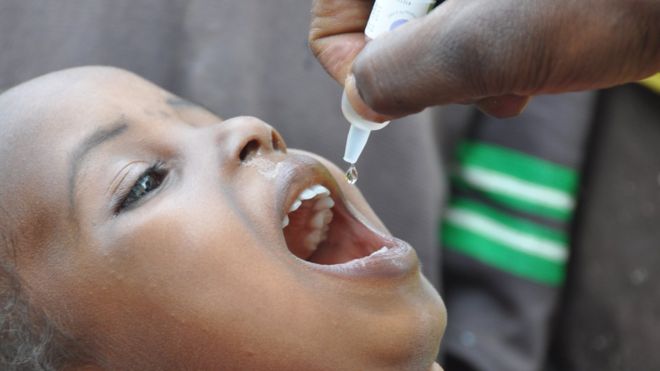
Nigeria is set to be removed from
the list of polio endemic countries in what is being regarded as a
"milestone" on the quest to eradicate the disease.
The
announcement by the World Health Organization, is expected at a meeting
of the Global Polio Eradication Initiative (GPEI) in New York.It follows Nigeria going more than a year without a case of wild - naturally occurring - polio.
Three years without cases are required before it can be declared polio free.
It will mean there will be just two endemic countries - Pakistan and Afghanistan - where transmission of the paralysing virus has never been interrupted.
Jean Gough, Unicef country representative in Nigeria told me: "This is an important milestone, but it is too early to celebrate. We need to continue the efforts at every level if polio is to be eradicated."
Polio is spread by poor sanitation and contaminated water and usually affects children.
The virus attacks the nervous system and can cause irreversible paralysis - usually of the legs - within hours.
Partner organisations include the WHO, Rotary International and the Bill and Melinda Gates Foundation.
Challenge
Nigeria's progress against polio has been hard-fought.In 2003, some northern states boycotted the oral polio vaccine for nearly a year after scare stories that it caused sterilisation.
It led to the virus spreading to many countries that had been declared polio free.
In 2013 nine vaccinators were shot dead in Kano. But instead of being a deterrent, it galvanised support at every level.
The Nigerian government declared polio a national health emergency and greatly increased the number of vaccinators.
And community and religious leaders voiced their support.
As a result, the number of families refusing to have their children immunised has decreased sharply.
Boko Haram
The success has come despite the Islamist militant insurgency in north-east Nigeria.Earlier this month Unicef said half a million children had fled attacks by Boko Haram over the past five months.
Vaccine teams have been focussing attention on displaced families who have moved elsewhere in Nigeria, as well as fleeing to neighbouring countries like Cameroon, Chad and Niger.
I last visited Kano in northern Nigeria in 2005 and met Aminu Ahmed, and his son Umar - both of whom have been paralysed by polio.
His father - who runs a charity making hand-operated tricycles for polio sufferers - has become a campaigner for polio immunisation.
I went back to meet the family. Umar is doing well at school and he now joins his father in persuading families to be immunised.
Aminu Ahmed told me: "Ten years ago, it was very common to see families saying no to the vaccine - now they all want it.
"We say you do not want your children to be unable to walk, like me."
Sourced from bbc.co.uk
No comments:
Post a Comment